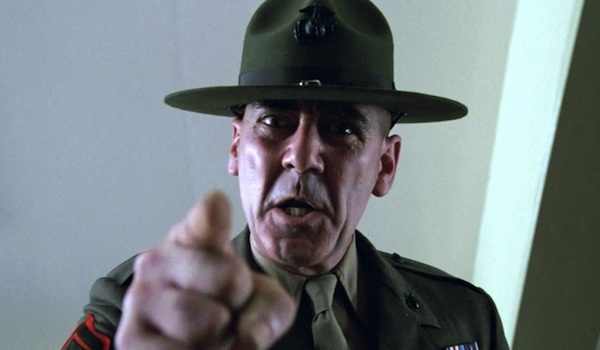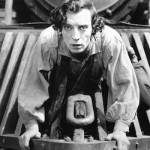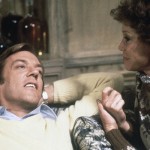Full Metal Jacket Review
Posted on May 27, 2012 By John Gilpatrick 1980s, Classic Reviews, Movie Reviews
In the immediate aftermath of the Vietnam War, Hollywood produced a series of spectacular anti-war films—The Deer Hunter, Coming Home, Apocalypse Now. Time, it seems, doesn’t heal all wounds as, almost a decade later, Oliver Stone’s Oscar-winning Platoon kicked off a second wave of Vietnam pictures. The world’s greatest director, Stanley Kubrick, got back in the anti-war-film game during this stretch with 1987’s Full Metal Jacket, an idea piece (as opposed to the more character-based Platoon and Born on the Fourth of July) that’s brilliant but in a cryptic kind of way.
The first half of the film follows a group of marine recruits going through training under the guidance of the hardass of all hardasses, Gunnery Sergeant Hartman (Lee Ermey). One of the recruits, the aptly monickered Private Gomer Pyle (Vincent D’Onofrio), is overweight and the constant #1 target of Hartman’s vicious verbal barbs. As these men’s training kicks in, they start to see Pyle (which is just a mean-spirited nickname) in the light Hartman paints him in. Only Private Joker (Matthew Modine) shows Pyle any compassion.
Eventually, the ridicule turns into tragedy just as Kubrick relocates us to Vietnam, presumably months after the events with Pyle and Hartman. The Joker, though, is still our protagonist. He’s graduated from basic and become a war reporter, er, propaganda writer. When he’s sent to the front lines, however, his duties take on meaning, as do the lessons he learned from his horrific training.
In the moment, Full Metal Jacket feels disjointed. Part one is near perfection, from the dialogue to the performances and more. D’Onofrio sells Pyle’s transformation exquisitely, and nobody can deliver rapid profanity like Lee Ermey. Once things move to Nam, however, the film loses steam. Matthew Modine is fine in a roll that doesn’t ask him to much in the way of heavy lifting. It’s understated, but effective work. For a while, though, he’s saddled with just following along as the group of marines he’s covering moves from skirmish to skirmish. Sometimes, they take out their enemy; Other times, one of their own men gets taken out.
During these sequences, Kubrick becomes the star. There’s one long take of Joker’s cameraman filming the men in the trenches that’s set to “Surfin’ Bird” and is one of the director’s all-time best. Stuff like this keeps us invested when Joker and Co. can’t. The extended climax, however, is rousing. The blood flows and our heroes’ morals are really put to the test. It’s complex stuff and ties everything together in such a satisfying way.
It’s easy to forgive Full Metal Jacket its few flaws because of Kubrick’s extraordinary skill behind the camera and the great way he brings the film home. However, it’s not as easy to forget those flaws. Full Metal Jacket is this sea of excellence, but there’s a small pocket of lifelessness polluting it. You can pretend it’s not there, but a view from the top says otherwise. But whatever. Kubrick is still king, and Full Metal Jacket is a terrific film.
1987, 3.5 Stars, Abigail Mead, Adam Baldwin, Apocalypse Now, Born on the Fourth of July, Coming Home, Douglas Milsome, Full Metal Jacket, Gustav Hasford, Martin Hunter, Matthew Modine, Michael Herr, Platoon, R. Lee Ermey, Stanley Kubrick, The Deer Hunter, Vincent D'Onofrio
















